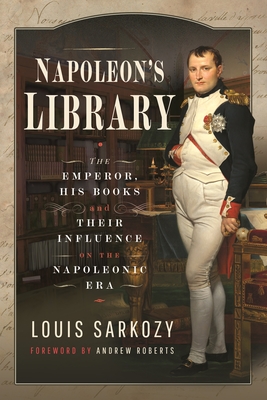
Sarkozy, Louis N.
product information
description
onaparte's intimate relationship with books and history, going far beyond his more militaristic and imperial fame.
Napoleon Bonaparte held absolute political power in France and his influence stretched across Europe and beyond. Yet he remained - between leading his armies and ruling over a vast empire - an indefatigable reader who even carried libraries into battle.
Bonaparte's love of the written word, birthed in childhood and nurtured as an adolescent and young adult, never left him. He was a lover of literature for its own sake - often swooning over melodramatic love stories - but he also understood the value of books as instruments of power. Before his campaigns, he poured over dozens of texts relating to the relevant theatres' geography, population, trade, and history. When contemplating grave decisions, such as his divorce to Empress Josephine, he consulted the historical record for useful precedents to justify and inform his actions. To bolster his troop's morale during challenging times, he constantly referenced history in his proclamations, making his contemporaries feel as if they were actively shaping history. They were.
The library of an individual is the key to his mind. Behind the grandiose paintings of the victorious conqueror and the constructions of the propagandist, stands the reader. This book is an attempt to glimpse Napoleon's character without the veneer of imperial glory.
What was he like, alone at night by his fireplace? What thoughts percolated in the mind of the ambitious 20-year-old, isolated in a little room while theorizing about man's happiness? Who are the literary and historical figures which can claim to have had impacted his life? Who were his favourite authors?
Through this book the reader will embark on a literary promenade with the great general and statemen. In these pages are found the emperor's favourite authors. And with them, the key to understanding his mind.
Napoleon Bonaparte held absolute political power in France and his influence stretched across Europe and beyond. Yet he remained - between leading his armies and ruling over a vast empire - an indefatigable reader who even carried libraries into battle.
Bonaparte's love of the written word, birthed in childhood and nurtured as an adolescent and young adult, never left him. He was a lover of literature for its own sake - often swooning over melodramatic love stories - but he also understood the value of books as instruments of power. Before his campaigns, he poured over dozens of texts relating to the relevant theatres' geography, population, trade, and history. When contemplating grave decisions, such as his divorce to Empress Josephine, he consulted the historical record for useful precedents to justify and inform his actions. To bolster his troop's morale during challenging times, he constantly referenced history in his proclamations, making his contemporaries feel as if they were actively shaping history. They were.
The library of an individual is the key to his mind. Behind the grandiose paintings of the victorious conqueror and the constructions of the propagandist, stands the reader. This book is an attempt to glimpse Napoleon's character without the veneer of imperial glory.
What was he like, alone at night by his fireplace? What thoughts percolated in the mind of the ambitious 20-year-old, isolated in a little room while theorizing about man's happiness? Who are the literary and historical figures which can claim to have had impacted his life? Who were his favourite authors?
Through this book the reader will embark on a literary promenade with the great general and statemen. In these pages are found the emperor's favourite authors. And with them, the key to understanding his mind.
member goods
No member items were found under this heading.
Return Policy
All sales are final
Shipping
No special shipping considerations available.
Shipping fees determined at checkout.







